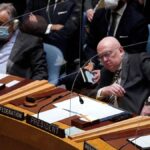
As Feb. 22, 2022, dawns, the world watches to see if Russia launches an invasion of Ukraine. Yesterday Vladimir Putin formally recognized two Russian-backed separatist regions of eastern Ukraine and this morning ordered Russian troops to occupy the breakaway regimes. Within minutes the West condemned the occupation.
President Joe Biden ordered a mild set of sanctions against Russia. Where the situation goes from here is anyone’s guess, but there is an interesting, even frightening history to this incident.
Russia, and its predecessor the Soviet Union, has had a long history of invading its neighbors. For instance:
• In September 1939, the Soviet Union, in cooperation with Nazi Germany, invaded Poland and by prior agreement divided the country in half.
• Between 1944 and 1946, the USSR invaded Poland again to put down anti-Communist resistance. (Also, during this period the USSR occupied the Baltic States, Estonia, Latvia and Lithuania, until the 1991 fall of the USSR).
• The USSR invaded Hungary in 1956 to halt democratic reforms of the government
• In 1968, Soviet troops invaded Czechoslovakia in order to overthrow a democratically elected government and reforms implemented by Czech President Alexander Dubcek.
• The Soviets invaded Afghanistan in 1979 to bolster the corrupt Communist regime in Kabul in its fight against Taliban insurrectionists. The Soviets occupied the country for 10 years before evacuating the country in disgrace.
• Russian troops invaded Georgia in 2008 and occupy one-fourth of the country today.
• Russia invaded and occupied the Ukrainian region of Crimea in 2014, under the guise of protecting Russian-speaking Cossacks living there.
Also, in 2014, simultaneous to the invasion of Crimea, separatist Russian groups took control of two regions of eastern Ukraine and set up their own governments. They were assisted by Russian military troops wearing no identifiable insignia.
In an incident of international significance, the participating Russian troops shot down a Malaysian commercial airliner transiting Ukrainian airspace. The Boeing 777 carried 283 passengers and 15 crew. All were killed in the missile attack.
• Today, Russian troops have entered eastern Ukraine in support of the Russian-speaking separatists who have been fighting Ukrainian troops since 2014.
It also serves to remember how Putin came to power in 1999. At the time he was the head of the FSB, the Russian re-branding of the KGB. President Boris Yeltsin was in need of a prime minister; Putin was recommended by former Communists in the government.
The Russian government was teetering on the brink, faced with a sinking economy, wholesale theft of industrial assets and a growing revolt in Chechnya.
Putin was appointed prime minister in 1999. Between Sept. 4 and 16 of that year, a series of bombings of apartment blocks in Buynaksk, Moscow and Volgodonsk took place, killing 300 residents and injuring more than 100. A fourth bomb, in Ryazan, failed to explode.
Journalists on the scene reported that residents of the block identified local FSB agents as placing the bombs. Fear of additional attacks swept the country. The Russian government blamed the bombings as the act of Chechen terrorists and Putin ordered the bombing of Grozny, the Chechen capital. The bombing and Russian invasion of Dagestan launched the Second Chechen War.
Putin’s handling of the bombings and “Chechen” terrorism increased his popularity throughout Russia. Several Russian journalists investigated these events and reported FSB involvement. Russian journalist Anna Politkovskaya, who investigated and reported on the bombings and war in Chechnya, was gunned down in the lobby of her Moscow apartment building by unidentified assailants.
Accusations of Russian FSB involvement have been the subject of a number of articles and books over the years, Former Russian State Security Council chief Alexandr Lebed, in his Sept. 29, 1999, interview with Le Figaro, said he was almost convinced that the government organized the terrorist acts.
Andrei Illovionov, a former key economic adviser to the Russian president, said that FSB involvement “is not a theory, it is a fact. There is no other element that could have organized the bombings except for the FSB.”
In his tenure, Vladimir Putin has orchestrated Russian terror attacks from within his regime. Now he has invaded a neighboring sovereign country under another “false flag” subterfuge. What is next?
Putin is a bully, an aggressor and only gets into fights that he is guaranteed to win. The U.S. and West needs to remember that. And one more thing, he’s an autocrat. The only way they leave power is in a box.
Bill Browning is a Gadsden resident
This article originally appeared on The Gadsden Times: A look at Putin’s decision to evade Ukraine




